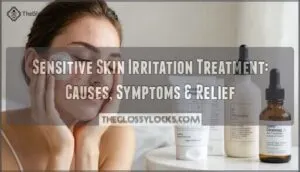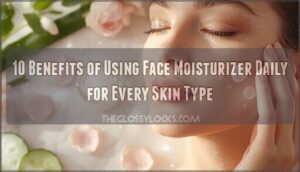This site is supported by our readers. We may earn a commission, at no cost to you, if you purchase through links.

Start with fragrance-free moisturizers and avoid harsh soaps, alcohol-based products, and synthetic fragrances. Cool compresses can provide immediate relief, while anti-inflammatory creams containing ingredients like ceramides or colloidal oatmeal help restore your skin’s protective barrier.
If you’re experiencing severe burning, itching, or persistent redness, consider over-the-counter hydrocortisone cream for short-term relief. The key to effective sensitive skin irritation treatment is identifying your specific triggers and building a simplified skincare routine.
What many don’t realize is that timing and application techniques can make all the difference.
Table Of Contents
- Key Takeaways
- Sensitive Skin Symptoms
- Common Skin Irritants
- Skin Conditions and Triggers
- Treatment and Management
- Prevention and Relief
- Frequently Asked Questions (FAQs)
- How can I prevent sensitive skin irritation?
- What should I do if I have sensitive skin?
- How do you treat irritated skin?
- What is sensitive skin?
- What should I avoid if I have sensitive skin?
- What medical conditions can cause sensitive skin symptoms?
- What to put on sensitive, irritated skin?
- How to treat skin rashes on kids?
- What calms skin irritation?
- Can sensitive skin be permanently cured?
- Conclusion
Key Takeaways
- Identify your personal triggers by keeping a daily diary of reactions to products, fabrics, and environmental factors – this helps you avoid specific irritants that cause your flare-ups
- Stick to fragrance-free, hypoallergenic products with gentle ingredients like ceramides or colloidal oatmeal that repair your skin barrier without causing additional irritation
- Apply cool compresses and moisturize immediately after gentle cleansing to provide quick relief from burning, itching, and inflammation symptoms
- Use short-term hydrocortisone cream sparingly for severe symptoms, but do not rely on it daily – consult a dermatologist if irritation persists beyond a week or worsens
Sensitive Skin Symptoms
You’ll recognize sensitive skin symptoms when your body sends clear warning signals that something isn’t right.
These reactions range from visible changes like raised patches and rashes to uncomfortable sensations including burning, itching, and stinging that can make daily activities challenging.
Raised Patches and Rashes
When you spot raised patches and rashes on your skin, you’re looking at classic signs of skin irritation.
These red bumps and itchy patches can appear suddenly, creating skin lesions that signal allergic reactions or skin inflammation.
Rash treatment becomes essential when these raised patches spread, causing skin redness that demands immediate attention and proper care.
Understanding the skin barrier function is vital in addressing sensitive skin irritation causes and finding effective relief to achieve proper care.
Dryness and Discoloration
When skin irritation affects more than just surface texture, skin dryness and discoloration often follow.
Moisture loss leaves your skin feeling tight and flaky, while facial discoloration creates uneven patches that make you self-conscious about your appearance.
- Dry patches appear as rough, scaly areas that feel uncomfortable to touch
- Skin hyperpigmentation creates darker spots where inflammation occurred previously
- Moisture loss accelerates when your skin barrier becomes compromised by irritants, leading to moisture loss and causing skin dryness.
Burning and Itching Sensations
Fire courses through your nerves when sensitive skin encounters irritants, creating intense burning sensations that demand immediate attention.
Your skin screams when irritants attack, sending fire through every nerve that demands immediate relief.
These uncomfortable feelings signal your skin’s protective barrier is compromised. Itching control becomes essential as scratching worsens irritation.
Burning relief starts with identifying irritation causes like harsh soaps or environmental triggers. Sensitive nerves overreact to normal stimuli, amplifying discomfort.
Skin soothing techniques and proper skin irritation treatment options help restore comfort and prevent further sensitive skin relief challenges, providing burning relief and promoting skin soothing techniques for sensitive skin and itching control.
Pain and Stinging Sensations
After dealing with burning and itching, you might notice skin pain or stinging sensations that feel like tiny needles or a sunburn gone wrong.
These symptoms can point to nerve damage or ongoing irritation.
For skin irritation relief, try gentle moisturizers, cool compresses, and itch relief creams.
Soreness management and pain control are key—avoid harsh products for burning relief and stinging relief.
Common Skin Irritants
Your skin encounters potential irritants every single day, from the fabric softener in your clothes to the cleaning spray under your kitchen sink.
Your skin faces a daily assault from hidden irritants lurking in everyday products and environments.
Understanding which common substances trigger sensitive skin reactions helps you make informed choices about the products you use and environments you create in your home, which is crucial for maintaining a healthy and comfortable living space with minimal irritants.
Environmental Factors
Your environment plays a bigger role in skin sensitivity than you might think.
Air pollution, climate change, and weather changes create a perfect storm for irritation.
Here’s what’s working against your skin daily:
- Air pollution increases barrier dysfunction in 43% of sensitive skin cases
- Urban smog raises skin irritation rates by over 22% in high-traffic areas
- Temperature swings cause flare-ups in 58% of people with sensitive skin
- Dry winter air reduces skin hydration by up to 20%
- UV exposure worsens inflammation markers in nearly 30% of cases
These environmental modifications to your surroundings directly impact your skin’s protective barrier, making it more reactive to everyday irritants.
Household Cleaning Products
Daily scrubbing routines shouldn’t turn your home into a hazard zone for sensitive skin.
Harsh chemicals in household cleaning products can trigger immediate reactions, causing redness and burning sensations. Common irritant products contain toxic substances that penetrate compromised skin barriers.
Choose fragrance-free products and hypoallergenic alternatives to avoid skin sensitivity triggers from cleaning agents.
Makeup and Laundry Detergents
Beauty products and laundry detergents can trigger skin irritation through harsh chemicals and fragrances. You’ll want to choose fragrance free options and gentle cleansers to protect sensitive skin from detergent allergies and makeup removal mishaps.
- Switch to hypoallergenic makeup and fragrance-free products for daily use
- Look for "free and clear" laundry detergents without dyes or perfumes
- Remove makeup with gentle, oil-based cleansers instead of harsh wipes
- Test new products on your inner wrist before applying to your face to avoid skin irritation
Scented Products and Clothing Fabrics
Scented soaps and perfumed lotions can trigger reactions in people with sensitive skin.
Your favorite fabric softener might leave behind residue that causes itching throughout the day.
Clothing dyes and textile irritants in synthetic materials often worsen symptoms.
| Product Type | Common Irritants | Fragrance Free Alternative |
|---|---|---|
| Laundry Products | Fabric softeners, scented detergents | Unscented detergent, white vinegar |
| Clothing Items | Synthetic dyes, chemical treatments | Natural cotton, bamboo fabrics |
| Personal Care | Scented soaps, perfumed lotions | Fragrance free moisturizers, gentle cleansers |
Switch to fragrance free products and natural fabrics to reduce fabric allergy risks and prevent skin irritation causes.
Skin Conditions and Triggers
Your skin’s reaction to irritants isn’t random—specific conditions make you more vulnerable to sensitivity triggers.
Understanding which skin conditions increase your susceptibility helps you identify why certain products, environments, or activities consistently cause problems, related to your skin’s natural reaction.
Eczema and Rosacea
Eczema treatment and rosacea care target different triggers but share similar management approaches.
These chronic skin conditions cause persistent skin inflammation and require ongoing attention. Eczema typically appears as dry, thickened patches with scaling, while rosacea manifests as facial redness with visible blood vessels.
Both respond well to gentle moisturizers and trigger avoidance for effective redness reduction. Understanding skin disorder types is essential for developing personalized treatment plans.
Contact Dermatitis and Psoriasis
Contact dermatitis strikes when your skin barrier breaks down after touching irritants like soaps, detergents, or metals such as nickel. This skin inflammation creates red, itchy rashes with blisters and swelling.
Irritant contact dermatitis happens immediately, while allergic contact dermatitis develops through immune reactions.
Psoriasis care differs entirely—it’s an autoimmune condition causing thick, scaly patches requiring specialized dermatitis treatment approaches.
Allergic Reactions and Photodermatoses
Your immune system sometimes overreacts to harmless substances, triggering allergic contact dermatitis when you touch allergens like nickel or fragrances.
Photodermatoses develops when UV rays activate certain chemicals on your skin, creating painful reactions.
Common triggers include:
- Nickel in jewelry and clothing fasteners
- Fragrances in cosmetics and detergents
- Latex in gloves and medical devices
- UV-activated chemicals in sunscreens or medications
These immune reactions cause redness, swelling, and blistering that requires targeted sensitive skin irritation treatment.
Aging and Hormonal Changes
As you age, your skin’s natural defenses weaken.
Hormone fluctuations during menopause symptoms reduce estrogen, causing up to 50% of women to experience increased skin sensitivity.
Hormonal imbalance affects skin elasticity and moisture retention, and aging skin produces less collagen annually, making it more reactive to irritants.
These hormonal changes create perfect conditions for sensitive skin and require targeted skin irritation treatment approaches.
Treatment and Management
When sensitive skin acts up, you’ll need targeted treatments that calm irritation without making things worse.
The right combination of gentle moisturizers, anti-inflammatory creams, and protective measures can help restore your skin’s comfort and barrier function.
Moisturizing Creams and Ointments
Your skin’s protective shield needs reinforcement through consistent moisturizing.
Natural moisturizers and hypoallergenic lotion create essential moisture barriers that prevent water loss.
Look for fragrance-free products containing ceramides, glycerin, or hyaluronic acid—these cream ingredients actively repair your skin barrier.
Calming skin cream with colloidal oatmeal soothes irritation while skin hydrators lock in moisture.
Different ointment types offer varying protection levels for your specific needs.
Using a hypoallergenic cream can be particularly beneficial for sensitive skin.
Anti-Itch Creams and Steroid Creams
While moisturizers help maintain your skin’s protective barrier, sometimes you need targeted relief for persistent itching and inflammation. Anti-itch creams and steroid creams offer different approaches to managing sensitive skin flare-ups.
Here are five key considerations for choosing effective itch relief:
- Cream Potency Levels – Start with low-potency hydrocortisone (1%) for mild irritation, reserving stronger formulations for severe symptoms under medical guidance.
- Steroid Side Effects – Limit use to 7 days maximum to prevent skin thinning, stretch marks, or rebound inflammation when discontinued.
- Itch Relief Mechanisms – Non-steroid options like pramoxine provide up to 87% overnight relief without corticosteroid risks for long-term use.
- Cream Ingredients – Choose fragrance-free, hypoallergenic formulas with ceramides that restore your skin barrier while delivering antiinflammatory benefits.
- Topical Application Tips – Apply thin layers 3-4 times daily to clean, dry skin, avoiding broken areas where systemic absorption increases risk.
These calming skin creams work as effective skin irritation remedies when used properly. For sensitive skin issues, consider using hypoallergenic creams to minimize adverse reactions.
Oral Antihistamines and Sunscreen
When topical treatments aren’t enough, oral antihistamines like diphenhydramine provide allergy relief by blocking your body’s inflammatory response to irritants.
These medications offer itch prevention from within, targeting the root cause of sensitive skin reactions.
Meanwhile, broad-spectrum sunscreen with SPF 30+ acts as your daily shield against sun damage, preventing photodermatoses and reducing medication interaction risks that could worsen skin irritation treatment outcomes.
Using a mineral based sunscreen can help reduce the risk of irritation and provide long-lasting protection.
Hypoallergenic Moisturizers and Colloidal Oatmeal
Hypoallergenic products work wonders for sensitive skin by cutting out common irritants that trigger reactions.
These gentle moisturizers contain ingredients like ceramides and glycerol without harsh fragrances or dyes. Colloidal oatmeal acts as a natural remedy, improving your skin’s barrier function while soothing inflammation.
When choosing fragrance-free products, you’re giving your skin the TLC it deserves for lasting relief. Using a hypoallergenic moisturizer can be an effective way to manage sensitive skin conditions with the help of natural remedies.
Prevention and Relief
Preventing sensitive skin irritation starts with identifying and avoiding your personal triggers, whether they’re harsh soaps, certain fabrics, or environmental factors.
You can also use gentle skincare routines and protective measures to keep flare-ups at bay while managing symptoms when they do occur.
Avoiding Triggers and Irritants
Identifying your specific skin irritation triggers marks the first step toward lasting relief.
Keep a daily diary tracking reactions to fragrance-free products, clothing fabrics, and environmental changes. Common skin irritants include nickel in jewelry, harsh detergents, and scented cosmetics.
Allergen Testing through patch tests helps pinpoint exact culprits. Daily Precautions like choosing hypoallergenic products and reading ingredient labels prevent future flare-ups effectively.
Understanding skin barrier dysfunction is essential in developing an effective sensitive skin care routine, which involves being aware of skin irritants and taking daily precautions.
Short-Term Topical Corticosteroids
When acute skin irritation treatment becomes necessary, short-term topical corticosteroids offer powerful itch relief.
These prescription creams reduce skin inflammation quickly, typically within three to four days.
Low to medium potency steroid therapy works best for most sensitive skin conditions.
However, corticosteroid creams shouldn’t become your go-to solution—they’re meant for brief flare-ups, not daily use, as they provide powerful relief only for a short period.
Long-Term Management and Phototherapy
Chronic sensitive skin requires a strategic skin care routine combining daily moisturizers with ceramides and targeted Phototherapy Options.
Light Therapy treatments offer Chronic Relief through controlled UV exposure, achieving 75% improvement rates.
Long Term Care includes barrier-repair ingredients, hypoallergenic sunscreens, and phototherapy sessions for effective skin sensitivity management and thorough skin irritation treatment.
Frequently Asked Questions (FAQs)
How can I prevent sensitive skin irritation?
You can prevent flare-ups by avoiding harsh soaps, fragrances, and known triggers. Use gentle, hypoallergenic products, moisturize daily, take shorter cool showers, and always wear broad-spectrum sunscreen.
What should I do if I have sensitive skin?
You’ll want to use gentle, fragrance-free products and moisturize daily. Avoid known triggers, wear sunscreen, take shorter lukewarm showers, and consider seeing a dermatologist for persistent issues.
How do you treat irritated skin?
Gently cleanse irritated skin with lukewarm water and fragrance-free soap. Apply cool compresses to reduce inflammation. Use hypoallergenic moisturizers with ceramides or glycerin. Try over-the-counter hydrocortisone cream for persistent irritation.
What is sensitive skin?
Ever feel like your skin throws tantrums over the smallest things?
You’ve got sensitive skin – a condition where your skin’s protective barrier becomes compromised, making it overreact to everyday irritants like products, weather, or fabrics with redness, burning, and itching.
What should I avoid if I have sensitive skin?
You’ll want to steer clear of fragrances, harsh detergents, and scented products that can trigger reactions. Skip rough fabrics, extreme temperatures, and always patch-test new skincare items first.
What medical conditions can cause sensitive skin symptoms?
Like ancient physicians treating melancholic humours, you’ll find eczema, rosacea, contact dermatitis, psoriasis, and photodermatoses commonly trigger your skin’s hypersensitive reactions to everyday irritants.
What to put on sensitive, irritated skin?
Apply fragrance-free moisturizer immediately after cool showers. Use gentle, hypoallergenic products with ceramides or colloidal oatmeal. Consider over-the-counter hydrocortisone cream for inflammation. Avoid harsh soaps and hot water.
How to treat skin rashes on kids?
When push comes to shove, you’ll want to act quickly but carefully with children’s rashes.
Start with cool compresses and gentle, fragrance-free moisturizers.
Consult your pediatrician for proper diagnosis and treatment recommendations.
What calms skin irritation?
Cool compresses and gentle moisturizers work wonders for irritated skin. You’ll find relief by avoiding harsh products, using fragrance-free creams, and applying topical treatments like hydrocortisone for inflammation.
Can sensitive skin be permanently cured?
Women experience sensitive skin at rates of 50-61% compared to men’s 30-44%.
Unfortunately, you can’t permanently cure sensitive skin, but you can effectively manage it through proper skincare routines and avoiding triggers.
Conclusion
Managing sensitive skin irritation treatment becomes second nature once you understand your unique triggers.
Success lies in consistency—stick to gentle, fragrance-free products and resist the urge to over-treat flare-ups.
Your skin’s barrier needs time to heal, so patience pays off. When symptoms persist beyond a week or worsen despite proper care, don’t hesitate to consult a dermatologist.
Remember, effective sensitive skin irritation treatment isn’t about complicated routines—it’s about finding what works and staying committed to it, which is often achieved through gentle, fragrance-free products and a consistent approach, ultimately leading to healing and proper care.
- https://www.dermatologyassociatesnj.com/blog/5-common-eczema-triggers
- https://www.healthline.com/health/skin-disorders/eczema-vs-rosacea
- https://www.aad.org/public/diseases/acne-and-rosacea/rosacea/triggers-could-be-causing-your-rosacea-flare-ups
- https://www.dermatologistnewyork.org/blog/5-tips-for-preventing-an-eczema-flare-up
- https://www.brassfielddermatology.com/conditions/rosacea













